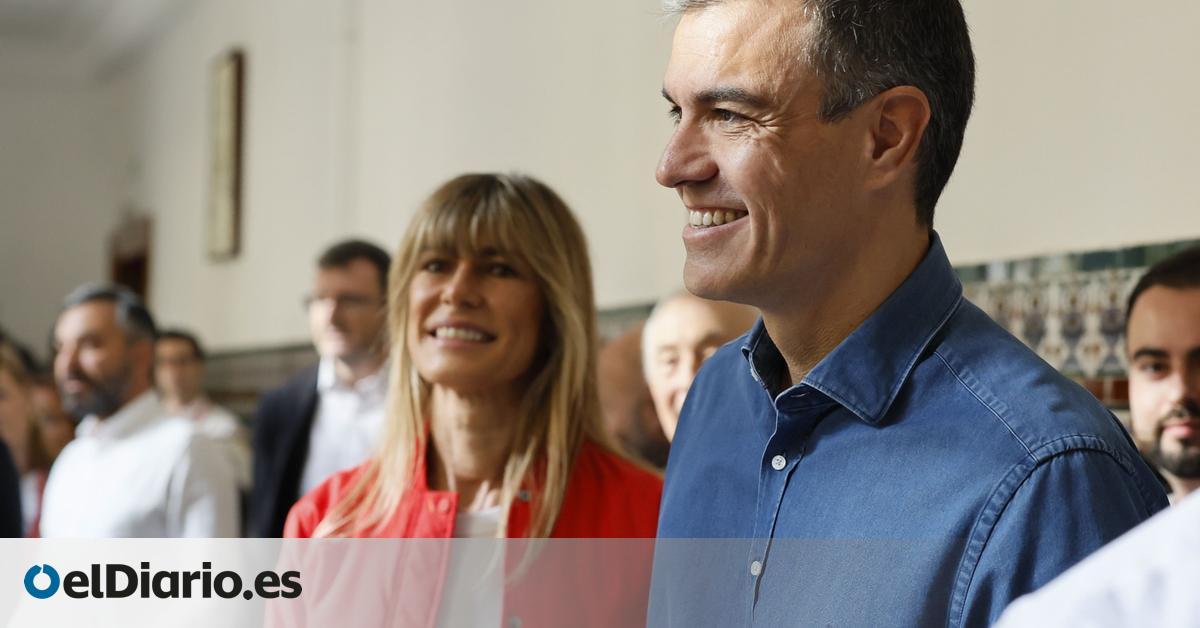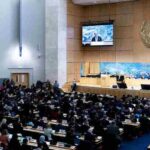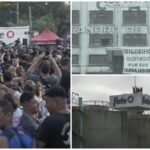
Judge Juan Carlos Peinado on Monday decided to take a statement as a witness from the President of the Government of Spain in the context of a case of influence peddling against his wife that the Prosecutor’s Office considers should be archived and when the higher authority than the magistrate, the Madrid Court, is still pending a ruling on the requests for closure. In the event that the appeals by Begoña Gómez’s defence and the Prosecutor’s Office against Pedro Sánchez’s summons do not prosper, Peinado will ensure the image and audio of the President of the Government testifying before him, probably reminding the judge of something he already knows: the law protects witnesses from not testifying in cases that are being brought against their spouses.
Peinado summons Pedro Sánchez with the arguments that there are “documents” in the case and “witness statements” that justify it. Although it was known on Monday, the judge adopted the decision on Friday, after Begoña Sánchez heeded the opinion of her lawyer and invoked the right of those under investigation not to testify. The lawyer Antonio Camacho explained later that she has nothing to hide and that she was only trying to safeguard her rights, when there is not a single clue against her within the limits that the Madrid Court has imposed on the judge’s investigation.
The Vox party, to which Manos Limpias has handed over the baton of the popular action, announced upon leaving the court that it would ask Peinado to give a statement as president. His letter was filed shortly before seven in the evening, but the judge does not say in his resolution that he will attend to the request of this popular accusation.
To quote Sánchez, Peinado mentions the modality of “chain influence peddling”, that is, influencing someone so that they in turn pressure someone else. It would be impossible to isolate the President of the Government from this “chain”: if Begoña Gómez had influenced her husband so that he, as President, would pressure a public company to award contracts to Juan Carlos Barrabés, Peinado would once again be taking testimony as a witness from a person against whom there are indications that he could be charged, which once again seriously questions the magistrate’s instruction.
The judge had already charged the businessman Barrabés after taking his statement as a witness. And on Monday he did the same with Joaquín Goyache, rector of the Complutense University, also after he appeared as a witness. If he had seen signs that they were incriminating themselves in their testimonies, the judge should have stopped their statements and called them to testify on another date, under investigation and in the company of a lawyer.
Peinado can claim that he has gathered evidence against both of them after their statements, but this is not the case. The change in Barrabés’ status to being investigated is based on the two UCO reports that were in the magistrate’s possession before he took his statement as a witness. The judge himself states this in his ruling.
In the case of rector Goyache, the judge says directly that he is accused according to his own statement, although he adds that it also influences the fact that it was made last Friday by vice-rectors José María Coello de Portugal and Juan Carlos Doadrio. Both confirmed before the magistrate what was already known, that the decision to create the extraordinary chair of Begoña Gómez was made by rector Goyache.
For the moment, the Prosecutor’s Office has had time to appeal Barrabés’s indictment. The Public Prosecutor’s Office requires basic questions from Peinado: “A judicial resolution with a minimum and sufficient motivation and reasoning, balanced and proportional to the nature of the resolution.” [de imputación]”.
A meeting in Moncloa within the innovation sector
Barrabés admitted to the judge that he had seen Sánchez on two occasions. The main one was during a meeting between the president and businessmen from the innovation sector and in the presence of the Secretary General of the Presidency. Gómez was not present. The second time was at an event with the president’s wife and other people, but Sánchez immediately excused himself when he received a call.
The status of the alleged corruption case in which Sánchez was summoned as a witness includes two extensive reports from the Central Operative Unit of the Civil Guard, drafted at the request of the judge, which exclude indications of crime in the contracts obtained by a company of Carlos Barrabés.
In 2020 and 2021, the UTE in which one of his companies participated was awarded contracts worth 6.7 million euros. The first offer included a standard letter of recommendation for the project signed by Begoña Gómez, as director of the department in which Barrabés had taught. Other people and institutions gave the businessman similar letters, including Madrid City Council, in the hands of the PP. The Civil Guard concludes that the awards were made within the regulated channels.
On the other hand, a ruling by the Provincial Court of Madrid established that these contracts were the only thing that could be investigated in relation to the Manos Limpias complaint because the rest were “conjectures” or a hoax. And the European Prosecutor’s Office took charge of investigating these awards, to the detriment of the judge.
With these elements, Begoña Gómez’s defense has requested that the case be closed, to which the Public Prosecutor’s Office has adhered. The timeliness of justice makes it almost impossible for the Provincial Court of Madrid to rule before Peinado carries out the proceedings. Meanwhile, the judge orders proceedings in orders of just one paragraph and at top speed, such as the summons of the head of the central Executive.
Gonzalez, Rajoy and Sanchez
With this framework, Sánchez will become the first president in office to testify before a judge in the investigation phase. Felipe González testified in the hearing for the kidnapping of Segundo Marey by the GAL and Mariano Rajoy did the same in the trial for the irregular financing of the PP or the black box.
The appeals announced by Gómez’s defense and the Prosecutor’s Office make it difficult to avoid Sánchez’s appearance. Judge Peinado has summoned the president by means of a ruling – instead of using a reasoned decision or resolution – so the appeals have to be presented first to him and, if he rejects them, to the Provincial Court on appeal, legal sources point out. It is almost impossible to complete all these procedures and have a ruling from the higher court before the 30th, they add.
Consequently, Peinado’s extra-procedural milestones will be indelible: three videos, two of Begoña Gómez and one of Pedro Sánchez, sitting before the magistrate. The one of Gómez’s first appearance, already leaked, and those that will be published in the future after the judge ignored the defense’s request that only the voice be recorded or that a watermark be put on the videos to know which part had sent them to the media.
In his brief ruling, Peinado took the opportunity to give instructions for the court officials to go to the La Moncloa Palace the day before so that Sánchez’s statement could be recorded. The judge expressly requested that there be “two technicians” on the 30th in case “any incident occurred that would prevent it from being recorded properly.”
The judge’s argument for not allowing Sánchez to testify in writing is that the facts for which he is being summoned have to do with his status as Begoña Gómez’s “husband.” Peinado presents this argument despite having previously announced that he was going to investigate Gómez for all the acts she had committed since her husband became “President of the Government.”
The magistrate’s arguments are opposed to a precedent. In 1991, the prosecution requested the testimony of the then president of Castile-León, José María Aznar, as a witness in the trial against the businessman Méndez Pozo. The Provincial Court of Burgos ruled in favour of Aznar answering the questions in writing because the facts about which he was being asked were related to his position as regional president – he met with the accused five times – when the crimes of the builder who was to be tried were committed.
The leader of the opposition, Alberto Núñez Feijóo, was quick to call for Pedro Sánchez’s resignation on Monday. “What an image for a country of a president entering a court to talk about the alleged corruption of his wife,” said the president of the PP. The PSOE describes the legal case as “a set-up by the right and the extreme right.” Its parliamentary spokesman, Patxi López, on Monday called the proceedings “the Peinado case.”
Source: www.eldiario.es

